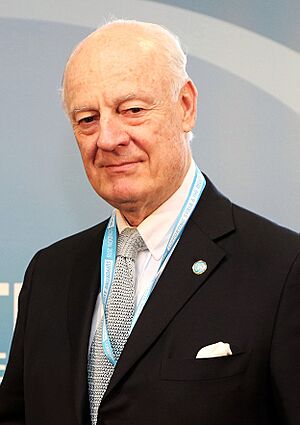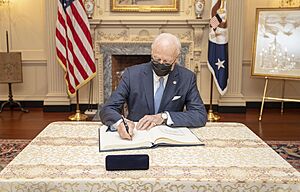Staffan de Mistura facts for kids
Quick facts for kids
Staffan de Mistura
|
|
|---|---|

Staffan de Mistura in 2016
|
|
| United Nations Personal Envoy for Western Sahara | |
| Assumed office 6 October 2021 |
|
| Secretary-General | António Guterres |
| Preceded by | Horst Köhler |
| United Nations Special Envoy for Syria | |
| In office 31 May 2014 – 31 October 2018 |
|
| Secretary General | Ban Ki-moon (UN) (2014–2016) António Guterres (UN) (since 2017) |
| Preceded by | Lakhdar Brahimi |
| Succeeded by | Geir Otto Pedersen |
| Deputy Minister of Foreign Affairs and International Cooperation of Italy | |
| In office 27 March 2013 – 28 April 2013 |
|
| Prime Minister | Mario Monti |
| Minister | Mario Monti (acting) |
| Under Secretary of State for Foreign Affairs and International Cooperation of Italy | |
| In office 29 November 2011 – 27 March 2013 |
|
| Prime Minister | Mario Monti |
| Minister | Giulio Terzi di Sant'Agata |
| Special Representative for the United Nations Assistance Mission for Iraq | |
| In office 2007–2009 |
|
| Secretary-General | Ban Ki-moon |
| Preceded by | Ashraf Qazi |
| Succeeded by | Ad Melkert |
| Personal details | |
| Born | 25 January 1947 Stockholm, Sweden |
| Nationality | Italian-Swedish |
| Occupation | Diplomat |
Staffan de Mistura (born on January 25, 1947) is a diplomat from both Italy and Sweden. He has worked for the United Nations (UN) and was also a member of the Italian government.
He had a long career of 40 years working for different UN groups. After this, he became an Undersecretary and then Deputy Foreign Minister in the Italian government led by Mario Monti. From 2014 to 2018, he served as the UN Special Envoy for Syria.
Before that, de Mistura held important UN roles. He was a Special Representative for the UN in Iraq (2007–2009) and Afghanistan (2010–2011). He also worked as a Personal Representative for the Secretary-General in Southern Lebanon (2001–2004). His work took him to many difficult places around the world. These included Afghanistan, Iraq, Rwanda, Somalia, Sudan, and the former Yugoslavia.
Since September 2019, Mr. de Mistura has been a professor at Sciences Po in Paris. He is also a Senior Visiting Fellow at Yale University.
Contents
Early Life and Inspiration
Staffan de Mistura was born in 1947 in Stockholm, Sweden. His mother was Swedish, and his father was Italian. His father's family was from Šibenik in Croatia. They left after World War II when Communists took over the country.
He studied political sciences at Sapienza University of Rome.
In the mid-1970s, he worked as an intern for the UN World Food Programme (WFP) in Cyprus. There, he saw a child get shot by a sniper. This child had crossed a dividing line in Cyprus. This event deeply shocked him. It also made him want to help solve conflicts peacefully. He decided to dedicate his life to humanitarian work.
Early Career (1970s–1990s)
In 1971, de Mistura began his UN career in Sudan with the WFP. In 1973, he was an Emergency Relief Officer in Chad. He led the first ever UN airdrop operation there. By 1976, he was a senior assistant at the UN Food and Agriculture Organization. He stayed in this role until 1985. During this time, he also took on special humanitarian tasks. These included missions to Dubrovnik, Sarajevo, Sudan, Ethiopia, Vietnam, and Laos.
In 1987, de Mistura returned to Sudan as the WFP Director of Operations. From 1988 to 1991, he managed fundraising for the UN office in Afghanistan. Later, he became a director for United Nations Children's Fund (UNICEF). He also represented UNICEF in Somalia.
In 1992, he was part of a UN mission in Nagorno-Karabakh.
He briefly served as the UN Humanitarian Coordinator for Iraq from March to August 1997.
In 1999, de Mistura was a member of the Security Council Panel on Humanitarian Issues in Iraq. He also worked as a Special Adviser for refugees in Kosovo for a short time. After that, he became the Regional Administrator for the Mitrovica Region in Kosovo.
Key Roles (2000–2013)
In June 2000, de Mistura was a Special Rapporteur at a forum in Fribourg. Until 2001, he directed the United Nations Information Centre in Rome.
From 2001 to 2004, de Mistura was the Personal Representative of Secretary-General Kofi Annan in Southern Lebanon. A big success there was setting up a de-mining operation. He then became the Deputy Special Representative for Iraq for 15 months, starting in January 2005. He worked hard to show a hopeful view of Iraq's recovery. He highlighted the UN's efforts to improve life for Iraqis.
After that, he directed the UN Staff College in Turin, Italy. On September 11, 2007, Ban Ki-moon appointed him as his Special Representative (SRSG) for Iraq. He took over his duties in November 2007.
In July 2009, de Mistura left Iraq. He became the deputy executive director for External Relations of the World Food Programme in Rome.
In January 2010, he was offered the job as the UN special representative in Afghanistan. In March 2010, Ban Ki-moon officially appointed him as Special Representative of the Secretary General (SRSG) in Afghanistan. He also became Chief of the United Nations Assistance Mission in Afghanistan (UNAMA).
On November 28, 2011, he was named Undersecretary of Foreign Affairs in Italy. This was part of the government led by Mario Monti.
In May 2013, the Italian Government appointed him as a Special Envoy. His task was to help resolve a case involving two Italian Navy marines. They were held in India since February 2012. They were accused of accidentally killing two Indian fishermen. De Mistura was asked to find a fair solution. His goal was to ensure a quick trial and the return of the marines to Italy.
UN Special Envoy for Syria
On July 10, 2014, the United Nations Secretary-General Ban Ki-moon announced a new role for de Mistura. He was appointed as the special envoy to find a peaceful solution to the conflict in Syria.
One of his ideas was to create local "freezes" in fighting. These would be copied elsewhere. The goal was to combine them with humanitarian aid and political talks. This would change the conflict and lead to a better peace process.
In October 2016, de Mistura offered to personally guide rebel fighters out of Aleppo. This was to stop the bombing in Eastern Aleppo. He warned that Aleppo would be destroyed and thousands would die otherwise. The group Al-Nusra Front refused his offer. They later left Aleppo in December.

By 2018, de Mistura was the longest-serving UN mediator for the Syrian conflict. In October 2018, he announced he would step down at the end of November for personal reasons.
In his last report to the Security Council on December 20, 2018, Staffan de Mistura spoke about his efforts. He tried to move the peace process forward for four and a half years. He said the UN's work was not a replacement for countries talking to each other. He believed they "made some difference – but not enough." He listed important points from his time in the role:
- They saved lives with some ceasefires and de-escalations. These also helped get aid to places that needed it.
- They brought the government and opposition together. They also helped unite the opposition. However, the groups did not truly recognize each other as partners for talks.
- They worked with the groups to create key ideas for a shared future. But these ideas have not yet been put into action.
- They identified a clear plan for talks that the groups accepted. But they could not use its full potential.
- They strongly encouraged Syrian women to be part of finding peace. Women make up more than half the population.
- They also pushed for civil society to be included.
- They almost finished setting up a committee to write a new constitution. This was to help the political process. But there was still more work to do.
- They knew what was needed for a safe environment in Syria. They also knew what was needed for UN-supervised elections. But they could not start the work to make this happen.
In his final speech, de Mistura updated the Council on remaining challenges. He urged the Security Council to stay united to support UN efforts. He also asked them to support his successor, Geir Pedersen. He ended by saying the Council is responsible for keeping international peace and security.
UN Personal Envoy for Western Sahara
In late 2021, de Mistura was appointed as the UN personal envoy to Western Sahara. This role involves helping to find a solution for the future of this territory.
Honours and Awards
Staffan de Mistura has received many awards and honours for his work.
Honours
- Knight Grand Cross Order of Merit of the Italian Republic (2014)
- Commander French Legion of Honour (2012)
- Grand Officer Order of Merit of the Italian Republic (2007)
- Commander Order of Merit of the Italian Republic (2004)
Awards
- 2017: Prince Carl Medal
- 2016: Dag Hammarskjöld Medal of Honor
- 2016: Honorary Polish Prize of Sérgio Vieira de Mello
- 2016: International Swede of the Year
- 1991: Premio Airone d'oro for the Protection of Nature and Human Rights
Honorary Degrees
- John Cabot University, honoris causa (2021)
- UCLouvain, honoris causa (2013)
- University of Turin, honoris causa (2007)
Personal Life
Staffan de Mistura is a citizen of both Italy and Sweden. He holds the Italian title of marchese (marquess). He can speak many languages, including Swedish, Italian, English, French, German, Spanish, and some Arabic. He is married and has two daughters from a previous marriage.
See also
 In Spanish: Staffan de Mistura para niños
In Spanish: Staffan de Mistura para niños
 | Audre Lorde |
 | John Berry Meachum |
 | Ferdinand Lee Barnett |


